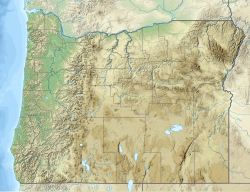The Siletz River Volcanics, located in the Oregon Coast Range, United States, are a sequence of basaltic pillow lavas that make up part of Siletzia.[1][2] The basaltic pillow lavas originally came from submarine volcanoes that existed during the Eocene.
| Siletz River Volcanics | |
|---|---|
| Stratigraphic range: Selandian-Ypresian (Tiffanian-Bridgerian) | |
 Exposed pillow lava in the Northern range | |
| Type | Formation |
| Underlies | Yamhill Formation |
| Lithology | |
| Primary | Sills of tholeitic to alkalic basalts |
| Other | Tuff-breccia, siltstone, sandstone |
| Location | |
| Coordinates | 44°54′N 123°24′W / 44.9°N 123.4°W |
| Approximate paleocoordinates | 47°00′N 107°30′W / 47.0°N 107.5°W |
| Region | Benton, Coos, Douglas, Lane, Lincoln, Polk, Tillamook, Washington & Yamhill Counties, Oregon |
| Country | |
| Type section | |
| Named for | Siletz River |
Description
editThe Paleocene to Eocene volcanics consist of volcanism flows and sills of tholeitic to alkalic basalts with associated tuff-breccia, siltstone and sandstone. The flows are vesiculated with zeolite filled amygdules.
The volcanics originated as oceanic crust and seamounts. Potassium argon dating gives ages of 58.1 ± 1.5 to 50.7 ± 3.1 Ma; Selandian to Ypresian.[2]
The sequence has been divided into a lower pillowed tholeiitic unit and an upper porphyritic alkali basalt unit.[3]
The volcanics occur in the following counties of western Oregon: Benton, Coos, Douglas, Lane, Lincoln, Polk, Tillamook, Washington and Yamhill.[2]
Fossil content
editThe sedimentary beds at the Ellendale Basalt and Portland Cement Company Quarries, interbeds in the upper part of the Siletz River volcanics, have provided fossils of the archaeogastropods Pleurotomaria (Entemnotrochus) baldwini, P. (E.) schencki and P. (E.) siletzensis.[4]
See also
edit- Coldwater Beds of British Columbia
- Golden Valley Formation of North Dakota
- Hanna Formation of Wyoming
- Indian Meadows Formation of Wyoming
- Margaret Formation of Ellesmere Island, Northwest Territories and Nunavut
- Nanjemoy Formation of Virginia, Maryland and District of Columbia
- Paskapoo Formation of Alberta
- Wasatch Formation of Colorado, Idaho, Montana, New Mexico, Wyoming and Utah
- Washakie Formation of Colorado and Wyoming
- Willwood Formation of Wyoming
References
edit- ^ Siletz River Volcanics at Fossilworks.org
- ^ a b c "Siletz River Volcanics and related rocks". USGS Mineral Resources On-Line Spatial Data. U.S. Geological Survey.
- ^ Hickman, 1976
Bibliography
edit- Hickman, C.S (1976), "Pleurotomaria (Archaeogastropoda) in the Eocene of the northeastern Pacific: a review of Cenozoic biogeography and ecology of the genus", Journal of Paleontology, 50: 1090–1102
- Snavely, Parke D.; MacLeod, Norman S.; Wagner, Holly C. (1968), "Tholeiitic and alkalic basalts of the Eocene Siletz River Volcanics, Oregon Coast Range", American Journal of Science, 266 (6): 454–481, Bibcode:1968AmJS..266..454S, doi:10.2475/ajs.266.6.454
Further reading
edit- Baldwin, E.M., 1974, Eocene stratigraphy of southwestern Oregon: Oregon Department of Geology and Mineral Industries Bulletin 83, 40 p.
- Duncan, R.A., 1982, A captured island chain in the coast Range of Oregon and Washington: Journal of Geophysical Research, v. 87, p. 10, 827–10, 837
- Snavely, P.D., MacLeod, N.S., and Wagner, H.C., 1973, Miocene tholeiitic basalts of coastal Oregon and Washington and their relations to coeval basalts of the Columbia Plateau: Geological Society of America Bulletin, v. 84, p. 387–424

